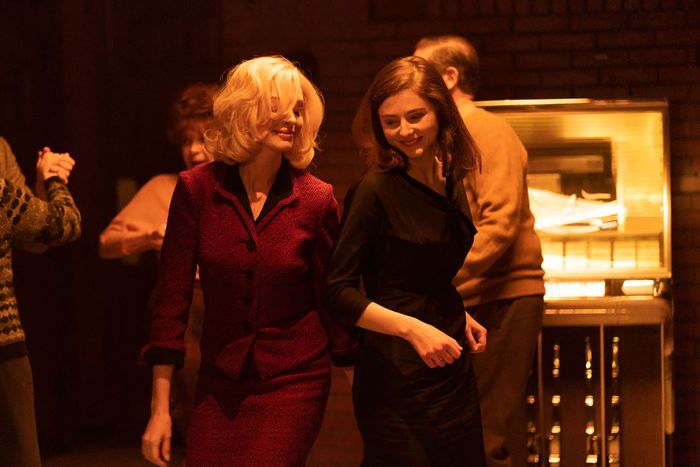
The 24-year-old woman for whom Eileen is named is a genuine weirdo, which no one around her notices because they’re accustomed to treating her like wallpaper. To be fair, Eileen Dunlop is played by Thomasin McKenzie, an actor who’s started to specialize in characters of a very cinematic sort of mousiness — peaked girls who, despite their obvious beauty, are considered impossibly plain and who’ve resigned themselves to a near invisibility in the eyes of the world. Eileen lives at home in the small Massachusetts town in which she grew up, where familiarity creates its own form of erasure. In the eyes of the community, she’s basically an outgrowth of her father, Jim (Shea Whigham), an alcoholic former cop who’s only being kept out of trouble by the indulgence of his former colleagues and who’s only alive thanks to her begrudging care. It’s no wonder that the arrival of Rebecca (Anne Hathaway), the new psychologist at the juvenile-detention center where Eileen works, cracks her closed world open. Rebecca isn’t just glamorous and strikingly modern by the standards of the ’60s setting. She seems to really see Eileen, her attention beaming down like the sun on a chilly winter landscape — though it turns out too warm to be real.
Eileen was adapted from a 2015 novel from Ottessa Moshfegh by Moshfegh herself, working with her husband, Luke Goebel. The results are a slender but engaging feature that’s as much a drama as it is a thriller, despite director William Oldroyd’s giving the proceedings an ominously Hitchcockian gloss. The film may not be as claustrophobically rooted in its protagonist’s head as Moshfegh’s book is, but its story is still very much hers, and it retains the feeling of being about an incident in her life rather than the collision of two disparate characters in a way that works to its advantage. Hathaway is an absolute scream as Rebecca — like Hugh Jackman, she’s a performer who can’t help but exude a touch of theatricality onscreen, and Rebecca is a role that puts that quality to excellent use. Her character’s hints of darkness seem to be as alluring to Eileen as her performance of sophistication. When she bursts onto the screen with her platinum hair and her Harvard degree and her affected mid-Atlantic accent, she’s a destabilizing force, yet it’s not Eileen for whom we worry. Eileen may feel seen by Rebecca, but we’re the ones actually watching her, and we understand the intensity of her restlessness more than this newcomer does.
Eileen is the second feature from Oldroyd, who has a real gift when it comes to actors. His debut, the 2016 Nikolai Leskov adaptation Lady Macbeth, provided an incandescent Florence Pugh with her breakout role as the resentful young wife of a local aristocrat whose rage consumed everyone around her. While Hathaway’s is the showier role in Eileen, Oldroyd coaxes an interestingly layered turn from McKenzie as well. Her Eileen is so disaffected that she sometimes seems to be doing her own sort of half-hearted performance, barely able to bring herself to play the dutiful daughter or the reliable employee, but also aware that no one will notice her lack of effort. She can’t keep her hands off herself when fantasizing about a glowering guard at work; she wears her late mother’s clothes when going out in her car, which is so busted she has to drive with the windows down so it doesn’t fill up with smoke. Rebecca, whose overtures of friendship take the form of a seduction, tucks her jackets elegantly over her shoulders, smokes cigarettes, looks like a movie star, and says “I live a little differently than most people” in ways that declare her cosmopolitan independence and hint at sapphic tendencies. But it’s Eileen who really lives differently, and she has a quietly feral potential that makes her more formidable than anyone around her appreciates.
There are some twists lurking in Eileen, though not as many as one might expect — it’s a fleet-footed movie, and not a long one. The film’s final act trembles on the edge of disaster, anchored by a terrific Marin Ireland as Rita Polk, the mother of one of the detention center’s most notorious inmates. Rita gives a monologue that emphasizes the grimmest horrors of the small community’s complacency, and all the things its residents — its women, really — are expected to accept in the name of status quo and maintaining a household. Her account is so squirmingly awful that Eileen’s distance looks in light of it like the only reasonable response to the place. Eileen may ultimately be a little thin, but it’s a bracing watch, powered not just by its two main performances but also by Ireland in that small but powerful role as a wretched enabler.
More Movie Reviews
- The Accountant 2 Can Not Be Taken Seriously
- Another Simple Favor Is So Fun, Until It Gets So Dumb
- Errol Morris Has Been Sucked Into the Gaping Maw of True Crime


